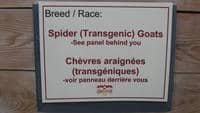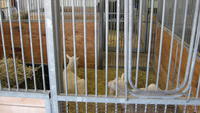Family Outing Turns to Shock
Ottawa, March 27, 2012 – Young families visiting the Agriculture Museum at the Experimental Farm in Ottawa this weekend were shocked to find two genetically modified (GM) goats among the farm animals on display.

Breed/Race: « Spider (Transgenic) Goats »
“Seeing the transgenic goats gave me a horrible, sick feeling inside. I just think it’s wrong,” said Beatriz Oliver, who brought her four-year-old daughter and two-and-a-half-year old son to the farm on Saturday not knowing the GM goats were at the museum, “I was glad they’re too young to read the signs. I didn’t want to have to tell them that someone put spider DNA into these goats. It’s unethical and unnecessary.”
The Central Experimental Farm in Ottawa is run by Agriculture Canada and houses the Canada Agriculture Museum with animal barns designed for family visits. The GM (also called genetically engineered or transgenic) goats are displayed with the sign “Spider (Transgenic) Goats” because they were genetically modified with genetic material from spiders, to create a silk that can be extracted from their milk to make textiles such as bulletproof vests. The final product is trademarked “BioSteel” but is not commercialized and the Canadian company, Nexia, that developed it no longer exists.
“The GM goats are leftovers from a failed business venture but are being used to promote genetic engineering,” said Lucy Sharratt of the Canadian Biotechnology Action Network (CBAN), « There has never been a democratic debate about GM animals in Canada. »
Nexia Biotechnologies was founded based on GM goat research at McGill University but was delisted from the Canadian Stock Exchange in 2009.

GM goats at the Ottawa Museum
The issue of GM animals is an urgent concern for Canadians because the University of Guelph in Ontario has asked Health Canada to approve its GM pig (modified with genetic material from a mouse). A GM Atlantic salmon could also be under review by federal departments; the government refuses to confirm or deny if a review is underway.
“These retired GM goats need to be housed somewhere but the museum should not be turned into a transgenic zoo to promote the biotech industry,” said Paul Slomp of CBAN.





